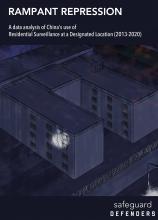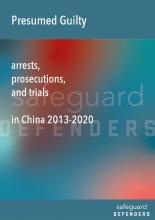A year of research, reporting and investigations
Since the summer of 2020, Safeguard Defenders (SD) has released a growing string of reports, investigations and evidence submissions to the UN on human rights and rule of law issues in China. Some of these have garnered widespread international attention, while others have been noticed only by those closely monitoring the field. Alongside our reporting on developments within the Chinese territory, we are also expanding our body of work on ‘China and the world’.
This post summarizes the many reports and investigations released over the last 12 months, serving as a possible background overview for those interested in keeping up with and studying the continuously deteriorating human rights environment in and from the People’s Republic.
The summer of 2020 began with the release of an investigation showing that the WHO - and UNAIDS before - employed a known human rights violator as a goodwill ambassador. Moreover, the WHO continued to do so even after those violations were revealed, thereby expressly violating its own code of conduct, which explicitly applies to its ‘ambassadors’. Only after reports on the issue by the Financial Times and UN Watch did the WHO offer somewhat of a response, claiming that goodwill ambassador and CGTN anchor James Chau was under investigation. Yet up to this day, the purported investigation is still ‘ongoing’ and until it is concluded, the WHO has no obligation to report any findings. It appears evident that the WHO is attempting to whitewash the situation, ensuring James Chau can be kept on as ‘ambassador’ even after his actions led to convictions in the UK for the very same human rights violations.
The investigation was followed by the publication of a manual providing a unique toolkit on how to investigate human rights violators in Hong Kong and China, released in both English and Chinese. Working with corporate due diligence analysts and private investigators, the manual is a goldmine for those wishing to use online resources to track down individuals, ownership of shell companies and much more.
 During the same summer of 2020, Safeguard Defenders started mapping the use of hostage diplomacy and how foreigners are targeted seemingly for political reasons - in a series that continues to be updated to this day -, and mapped how the information flow related to Covid-19 was being managed, with a focus on the use of disappearances, detentions, arrests and different forms of ‘forced public confessions’ of citizen journalists and others as a control measure.
During the same summer of 2020, Safeguard Defenders started mapping the use of hostage diplomacy and how foreigners are targeted seemingly for political reasons - in a series that continues to be updated to this day -, and mapped how the information flow related to Covid-19 was being managed, with a focus on the use of disappearances, detentions, arrests and different forms of ‘forced public confessions’ of citizen journalists and others as a control measure.
By the end of summer, SD published the Chinese language edition of a comprehensive and first of its kind guide on how civil society can engage with Magnitsky Acts’ sanctions to target human rights violators in China, providing practical guidelines on the filing and quality standards of such recommendations.
SD followed this by submitting a comprehensive review of China’s use of forced TV confessions to relevant bodies of the UN’s Human Rights system, complementing our earlier report Scripted and Staged and book Trial By Media on the same subject.
 Shortly thereafter, Rampant Repression was released - alongside a review to relevant bodies of the UN’s Human Rights system - revealing for the very first time the actual scale and scope of China’s use of the RSDL system for enforced disappearances and secret jailing.
Shortly thereafter, Rampant Repression was released - alongside a review to relevant bodies of the UN’s Human Rights system - revealing for the very first time the actual scale and scope of China’s use of the RSDL system for enforced disappearances and secret jailing.
An investigation followed in November 2020, detailing how the Ministry of State Security (MSS) was running a network of refugee spies in Sweden, first targeting Uyghurs and, more recently, Tibetans. A subsequent official investigation was followed by convictions in Swedish courts against two refugees – an extreme rarity in refugee espionage, as prosecution and trials of such cases rarely take place. The report showcased how the MSS - now based in Warsaw, Poland - worked to recruit such spies and how they communicated.
 The first report in the three-part series Access Denied was released towards the end of 2020. China’s Vanishing Suspects documents how some victims arrested were being put into pre-trial detention facilities to await trial under false names, thereby effectively disappearing them from both lawyers and families, sometimes for years, despite being inside the formal criminal judicial system.
The first report in the three-part series Access Denied was released towards the end of 2020. China’s Vanishing Suspects documents how some victims arrested were being put into pre-trial detention facilities to await trial under false names, thereby effectively disappearing them from both lawyers and families, sometimes for years, despite being inside the formal criminal judicial system.
A Vietnamese edition of the comprehensive guide on how to use Magnitsky Sanctions Acts’ on human rights violators soon followed.
The same winter, another investigation caused headlines around the world as SD revealed the existence of an agreement signed between Switzerland and China’s Ministry of Public Security (MPS). The agreement allowed MPS agents to enter Switzerland – and therefore the Schengen area – on tourist visas for unofficial visits kept from other EU governments – supposedly to help identify Chinese nationals staying in Switzerland illegally. Upon inspection the agreement, classified as a readmission agreement, had little in common with any of the 50+ such agreements signed with other countries, all of which were made public. Following intense criticism in Switzerland after the reveal, including from its Parliamentary Foreign Affairs Committee, upon expiration of the agreement the Swiss Government halted their pursuit to renew it.
Around the same time another investigation caught the public’s eye as SD used extensive witness accounts, CCTV camera footage and an analysis of a variety of rumours to show how Swedish bookseller Gui Minhai was actually kidnapped in Thailand and brought back to China, tracking the two weeks after his kidnapping in Pattaya before his return to China was formally confirmed.
 The second part of Access Denied, China’s False Freedom, became the first report to present yet another novel trend, documenting how politically sensitive prisoners are being placed into house arrest, often at unknown locations, after their release from prison.
The second part of Access Denied, China’s False Freedom, became the first report to present yet another novel trend, documenting how politically sensitive prisoners are being placed into house arrest, often at unknown locations, after their release from prison.
In the first months of 2021, SD’s longstanding campaign against the flaunting of international broadcasting rules by China Global Television Network (CGTN) started yielding results. Following a series of complaints to the UK regulator Ofcom on the ownership and repeated broadcasting of forced televised confessions, their license was revoked in the UK and significant fines were imposed (with several penalties still pending). Since then, CGTN has been taken off the air also in Australia, Norway and Sweden, while their practice is subject to investigations in the United States, Canada and France – the latter now holding their license to broadcast across Europe. These actions, and many other smaller ones, followed a string of individual complaints, an open letter campaign from victims and SD’s investigation into the true control and ownership of CGTN, which was transferred from the State directly to the Chinese Communist Party in 2018.
 In spring 2021, SD released Presumed Guilty, using official data from the Chinese Supreme Court and Chinese Supreme Procuratorate to statistically map the use of the criminal justice system in China in both recent days and in comparison with prior leadership eras.
In spring 2021, SD released Presumed Guilty, using official data from the Chinese Supreme Court and Chinese Supreme Procuratorate to statistically map the use of the criminal justice system in China in both recent days and in comparison with prior leadership eras.
Trapped in Dubai was a small ad hoc campaign investigating how a teenage dissident, while transiting in Dubai on his way from his home in Turkey to the United States, was being targeted as China sought his return via deportation for social media posts deemed counter to the relatively new 2018 Law on Martyrs and Heroes, despite having done so on a social media blocked in China and while living in Turkey. Attention to his case from international media and the U.S. government helped free him.
 SD’s most recent report Locked Up - which garnered worldwide attention in major media in most languages around the world - was released early in the summer of 2021. With the help of various artists providing sketches, drawings, reconstruction of papers and architectural plans, the publication shows how the RSDL system for secret imprisonment actually works and what life inside is like. It was followed by the release of brand new data based on official government statistics, showing the further expansion of the RSDL system, with a massive increase between 2019 and 2020, which was also provided as evidence to relevant bodies of the UN Human Rights system.
SD’s most recent report Locked Up - which garnered worldwide attention in major media in most languages around the world - was released early in the summer of 2021. With the help of various artists providing sketches, drawings, reconstruction of papers and architectural plans, the publication shows how the RSDL system for secret imprisonment actually works and what life inside is like. It was followed by the release of brand new data based on official government statistics, showing the further expansion of the RSDL system, with a massive increase between 2019 and 2020, which was also provided as evidence to relevant bodies of the UN Human Rights system.
Our last investigation released so far exposed how the UNODC - the UN agency for anti-corruption work - signed an agreement with China’s National Supervision Commission (NSC) – a non-judicial organ under direct Party-control. It also revealed that, despite repeated requests over a six-month period, UNODC refused to release the content of the agreement. This was followed by the release of new data, again using Party- and State statistics, showing the continued expansion of the NSC’s system for unlawful arbitrary detentions and disappearances, liuzhi, also provided as evidence to relevant bodies of the UN Human Rights system.
Finally, SD’s work to expose the situation of Baolige Wurina - an Inner Mongolian activist in Sweden who faced deportation -, received significant attention in Swedish media as well as in Parliament and international media. This contributed significantly to a stay in his deportation and the announcement of a new hearing to evaluate the increased threats against him as well as the overall deteriorating human rights situation in Inner Mongolia. SD is currently assisting two dissidents seeking asylum in the Netherlands and is engaged in supporting defence counsels to stop several cases of extraditions, continuing its longstanding work on extradition issues – both in individual cases, and through research and advocacy.